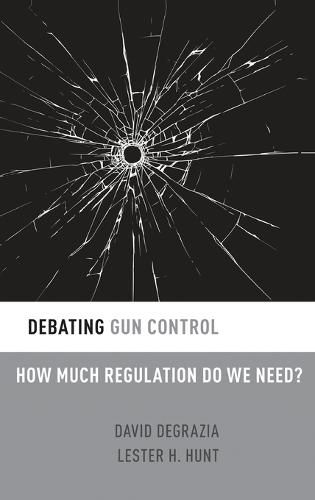Readings Newsletter
Become a Readings Member to make your shopping experience even easier.
Sign in or sign up for free!
You’re not far away from qualifying for FREE standard shipping within Australia
You’ve qualified for FREE standard shipping within Australia
The cart is loading…






Americans have a deeply ambivalent relationship to guns. The United States leads all nations in rates of private gun ownership, yet stories of gun tragedies frequent the news, spurring calls for tighter gun regulations. The debate tends to be acrimonious and is frequently misinformed and illogical. The central question is the extent to which federal or state governments should regulate gun ownership and use in the interest of public safety. In this volume, David DeGrazia and Lester Hunt examine this policy question primarily from the standpoint of ethics: What would morally defensible gun policy in the United States look like? Hunt’s contribution argues that the U.S. Constitution is right to frame the right to possess a firearm as a fundamental human right. The right to arms is in this way like the right to free speech. More precisely, it is like the right to own and possess a cell phone or an internet connection. A government that banned such weapons would be violating the right of citizens to protect themselves. This is a function that governments do not perform: warding off attacks is not the same thing as punishing perpetrators after an attack has happened. Self-protection is a function that citizens must carry out themselves, either by taking passive steps (such as better locks on one’s doors) or active ones (such as acquiring a gun and learning to use it safely and effectively).DeGrazia’s contribution features a discussion of the Supreme Court cases asserting a constitutional right to bear arms, an analysis of moral rights, and a critique of the strongest arguments for a moral right to private gun ownership. He follows with both a consequentialist case and a rights-based case for moderately extensive gun control, before discussing gun politics and advancing policy suggestions. In debating this important topic, the authors elevate the quality of discussion from the levels that usually prevail in the public arena. DeGrazia and Hunt work in the discipline of academic philosophy, which prizes intellectual honesty, respect for opposing views, command of relevant facts, and rigorous reasoning. They bring the advantages of philosophical analysis to this highly-charged issue in the service of illuminating the strongest possible cases for and against (relatively extensive) gun regulations and whatever common ground may exist between these positions.
$9.00 standard shipping within Australia
FREE standard shipping within Australia for orders over $100.00
Express & International shipping calculated at checkout
Americans have a deeply ambivalent relationship to guns. The United States leads all nations in rates of private gun ownership, yet stories of gun tragedies frequent the news, spurring calls for tighter gun regulations. The debate tends to be acrimonious and is frequently misinformed and illogical. The central question is the extent to which federal or state governments should regulate gun ownership and use in the interest of public safety. In this volume, David DeGrazia and Lester Hunt examine this policy question primarily from the standpoint of ethics: What would morally defensible gun policy in the United States look like? Hunt’s contribution argues that the U.S. Constitution is right to frame the right to possess a firearm as a fundamental human right. The right to arms is in this way like the right to free speech. More precisely, it is like the right to own and possess a cell phone or an internet connection. A government that banned such weapons would be violating the right of citizens to protect themselves. This is a function that governments do not perform: warding off attacks is not the same thing as punishing perpetrators after an attack has happened. Self-protection is a function that citizens must carry out themselves, either by taking passive steps (such as better locks on one’s doors) or active ones (such as acquiring a gun and learning to use it safely and effectively).DeGrazia’s contribution features a discussion of the Supreme Court cases asserting a constitutional right to bear arms, an analysis of moral rights, and a critique of the strongest arguments for a moral right to private gun ownership. He follows with both a consequentialist case and a rights-based case for moderately extensive gun control, before discussing gun politics and advancing policy suggestions. In debating this important topic, the authors elevate the quality of discussion from the levels that usually prevail in the public arena. DeGrazia and Hunt work in the discipline of academic philosophy, which prizes intellectual honesty, respect for opposing views, command of relevant facts, and rigorous reasoning. They bring the advantages of philosophical analysis to this highly-charged issue in the service of illuminating the strongest possible cases for and against (relatively extensive) gun regulations and whatever common ground may exist between these positions.